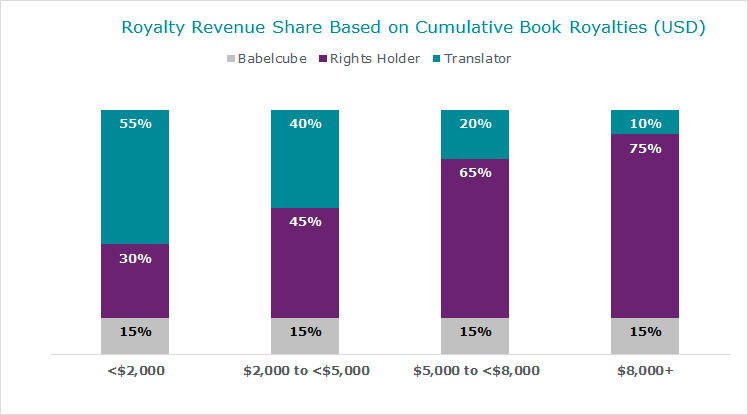British novelist Keith Dixon, who lives and writes in France, considers the potential role of free services for those keen to publish their books in foreign languages but lacking the budget for a professional translation.
I once translated a book from French into English. I charged a good rate, and it took almost a year. Would I have done it for free? Certainly not, but there are actually companies who do offer this service to authors who want to put their books in front of a wider international audience.
The best-known of these sites are probably Fiberead and Babelcube, and as these are the two I’ve tried I’m going to use them as my case studies. Fiberead currently offers translation into traditional and simple Chinese, whereas Babelcube can provide translators for more than ten languages.
Both use translators who work for free, on the basis that the translators and the company will take a fair proportion of any royalties. At Fiberead the author gets a straight 30%. At Babelcube it’s more complicated, but this table explains it simply:
Simple Guide on How to Use Fiberead and Babelcube
FIBEREAD
- Navigate to the site and create an account.
- Choose to upload your book and go through the process all indies are used to, including uploading your cover and, if possible, the main image without title or sub-titles. They’ll redesign it for Chinese.
- Upload your text in .doc or .docx format.
- ‘submit for audit’ and wait for a confirmation email.
- If accepted, a team is put together by Fiberead to translate the book, under the leadership of an ‘editor’. I believe the team is actually crowdsourced and probably uses Chinese students of English. You get no choice in this matter.
- Prepare for lots of questions, not just about language, but about manners. Metaphors or similes might not be understood. For example I compared an old theatre to an aunt that had been left out in the rain. I got a query stating that Chinese people don’t leave their relatives in the rain, so what was I saying?
- Prepare for a long wait. It took nearly a year for my book to be translated.
- After a round of copy-editing, it’s complete and starts to appear on Chinese ebook sites.
- You don’t get a free copy. I even tried to buy from Amazon.cn and created an account, but in the end it wouldn’t accept my purchase. Fiberead have not been helpful in providing me with one.
BABELCUBE
- Create an account and add a new book with the usual information, including links to the book’s Amazon, Goodreads and Facebook pages.
- This creates a nice page on Babelcube which acts as an invitation to translators to bid to translate the book.
- If you don’t want to wait for bids, you can look for translators by choosing a language and searching. This pulls up a list of translators and their star rating. You can click on their name to be taken to their own welcome page, then write them a note explaining why you’d like them to translate the book.
- Once you find a translator, both you and the translator sign an online agreement and set a date by which the first ten pages and the whole book will be translated.
- When the sample pages are sent, you can (and should) check them out by asking people who speak the language to read them.
- Once you’ve approved the sample, you wait for the rest of the translation to be completed. You can reject it in the end, but you have to provide full details of why you’re doing so.
- You must provide cover artwork for the translation.
The Experience
FIBEREAD
Communication with Fiberead and the Chinese translators was patchy at best. I would hear nothing for weeks or months on end, and then receive a list of over thirty questions to answer. I didn’t mind that, but it led to little sense of being involved in the translation. Part-way through the process, I was connected via Linked-In to a kind of project manager, but after the connection was made, I had no further communication from him.
It took the best part of a year for the book to be finished (on your dashboard you can see it going through the various stages of publication), but when it was completed there was little in the way of communication from the translator(s). Further, I never got to see the final copy. I asked repeatedly but the requests were ignored. They told me Amazon China doesn’t give them free copies, which I understand, but it would be nice to have even the final uploaded version, presumably in Word or similar format.
Eventually the book started appearing on Amazon China and other online stores. It’s currently showing on five of the fourteen sites they list as distributors. I persuaded the translator to give a review, which she did, and after a year I now have six glowing five-star reviews. Sales vacillate a lot on Amazon China. One sale can lead to a rise of several thousand rank positions. But the book has been placed in a bizarre category – ‘Orsay, exams’ according to Google Translate– which no one seems to understand. Fiberead says they can’t change it. The book is about a young actress engaged in a competition for a film role, and Amazon seems to have decided that this warrants placing it in a category for exam crib texts…
Overall I’d say that so far sales haven’t warranted the effort. Admittedly there was little effort other than answering about a hundred questions on the text. But sales have been limited, largely, I believe, because of the bizarre category in which the book has been placed. If Fiberead can change the keywords, as I’ve asked them to do, this may improve. I know others have had some success in China.
BABELCUBE
I’ve had a much better experience here. The first three translators I accepted for my book Actress, two for Spanish, one for Italian, all withdrew, and I began to have a bad feeling. But then I found a wonderful translator for Spanish, and things got back on track again. I now have three books translated, in Spanish, Portuguese and Italian, with three more in Portuguese and Italian on the way.
There was much less contact with these translators than with the Chinese one, but that probably means they were more au fait with the western culture that I was describing. There were occasional language questions but from all three translators I would say there were no more than a dozen. As with Fiberead, your contact is via email mediated through the company’s website – so you receive an email into your Inbox but have to go to the site to use their messaging system to reply. This isn’t a problem because at least you see everything in context and might pick up messages you’ve missed.
Post-completion, you’re told the book is available to download in Word format so you can check it out. This is the raw translation, without the forematter that Babelcube adds: copyright notices, translator and/or editor names. As with the sample, you can and should have this checked out by anyone you know who has the language, or make other changes yourself, before uploading the book back into the system. At this point you add your cover (in the correct language) and can choose the publisher (Babelcube, your name, your publisher’s name) and price and other descriptive information. Babelcube then converts the book into an .epub which you can download for a final check. Once you press “publish”, you’ll start to receive emails confirming the various stores to which the book has been distributed. Amazon can take weeks, for some reason, whereas Apple, Scribd, Kobo and Tolino get it almost immediately.
The problem I see for both of these routes is marketing. I have no idea how to market in Spain, Italy or Brazil. But I guess that’s the next tricky slope of the learning curve.
OVER TO YOU If you've ever used a free translation service, how did you get on? Would you recommend it? We'd love to hear about your experience via the comments box.
#Authors - #toptips for using free translation services for your #selfpub books - from @keithyd6 Share on XRELATED POSTS









Thank you for sharing this helpful blog post! It’s great to see the pros and cons laid out clearly, as well as the tips for finding and using the best free translation tools. One thing to consider that wasn’t mentioned in the post is the potential for machine translation to produce awkward or incorrect translations that could compromise the quality of the finished product. In some cases, it may be worth investing in professional translation services to ensure the highest level of accuracy and readability for readers in other languages. Overall, it’s important for authors to carefully weigh their options and consider all factors before deciding on the best translation solution for their work.
Impressive post specially the points you mentioned about the strategies could help me in my business. Some of the points were familiar to me and some them is very new for me.
Thank you so much for sharing this post with us. I’ll follow your blog posts from today onward.
Great Job!
My first experience with Babelcube was a nightmare. A Spanish translator got VERY angry that I dared to go through verifying. I speak enough Spanish to know that the word for brakeman (included in my book) was entered as “baker.” He also screwed up the copyright notice, making it available for anyone to copy. Good thing I had a friend look at it. He was so offended, he canceled the contract. So THAT was good.
I put it down to a fluke, and my German translator turned out to be highly professional, easy to work with, and FAST. I could hardly keep up with her! Fortunately, that book was released this past year. Very few sales though, sadly.
Being in Canada, I WANTED French the most. But the FRENCH one has been a nightmare. Slow, always an excuse, and she keeps changing my content, losing the spark of all the slang and detail I use. It’s nearly a YEAR later, and I only have 21 chapters out of 42 from her. The only way to get out of this contract would be to pay $500, which I don’t have enough to spare in my writer account, unless I can get another Bookbub deal. AND she’s removed herself from Babelcube, so I can’t even rate her there. Had to rant to someone. Babelcube sucks.
[…] Writing: How Helpful are Free Translation Services for Self-publishing Authors? […]
And in my latest news, my Writing tips and Tricks book has done well enough on Amazon.cn that Fiberead have decided to do it as paperback as well (which is never a given, you have to do well enough for it to warrant them spending the up front costs to print). I am very pleased about that. i have just sent them copies of my paperback cover etc, so that they have how the English version is done to work from.
[…] Free Translation Services | Self-Publishing Advice Center […]
Hello there, I’m a translator of English into Portuguese (I’m Brazilian). I’ve worked in many children publishers (Walker Books, Parragon and Reader’s Digest) and know how to make a text shine. Please contact me if you’d like to publish your book in Portuguese language. I charge an affordable set fee for the translation and don’t require royalty payments. My e-mail is [email protected]
I think the problem with Babelcube might be that they’re trying to do too much, as in too many languages at once, without the marketing support for foreign markets. Maybe a service like Babelcube, but only for one specific country and language, would work better, if it could also include some marketing advice for that specific country. I’m a German translator and author, and I’ve found my first fiction projects on Babelcube, but I have also seen many problems with them in terms of control you have over the books (not just as a translator, but also as an author). If anyone’s interested in experiences on Babelcube from a translator’s point of view, you can read about mine on my blog: http://bit.ly/2bI9Mk8. I would really like to see the possibility to choose whether or not you want to put your book in KDP Select or go wide, for example. In the end, I would recommend authors search for a translator outside of platforms like BC. There are translators who offer royalty split deals if you don’t have a big budget, and you’d be able to keep all the control over your book publishing.
Sounds like one should pursue independent translators so as to own all publishing rights to publish the books yourself. If you’re the publisher, then you should be able to change categories and keywords at will.
Two issues would be cost (presumably more expensive and upfront) and trust — setting up the account at Amazon.cn leads to exposure to revenue diversion.
If I were not seduced by the “corporate trust” shield of these two firms, I might look for, say, a Chinese-origin student at an American university and draw up a simple contract under US laws. Fees for services (upfront is tidier).
But what keeps one from publishing a Spanish-language title on Amazon.com, categories and all, and letting Amazon distribute it worldwide, including Amazon.es? That way you wouldn’t have to worry about categories being maintained by strangers.
Would that work even for a Chinese book? (Publish on Amazon.com, let Amazon relay your category/keyword info to Amazon.cn)
Karen, what you say works for other countries, but not for China. You can’t open a publisher account on Amazon.cn No-one can, without being approved by the Chinese government as a vendor for amazon – if you look at my listing, you will see, in the book details “Brand name: Fiberead” – to get a ‘brand name’, which is basically an approved seller identity, you have to live in China.
Thats the big advantage of Fiberead – they can get you onto Amazon.cn.
With them you have two options – full revenue share – no cost to you up front but less return for you long term, or part share – you pay up front, and keep a much higher percentage of the profits.
As far as Spanish etc – that’s exactly what I have done – got it translated by an independent and listed it myself on all Amazon sites through my normal Amazon publisher accounts.
I asked for a sample translation into Italian (via Babelcube) of one of my titles. I then sent the translation to Italy to a friend who is an academic and she read it and was horrified, saying not to waste my money, that it read like someone had pushed it through Google Translate. She saved me a bomb!
I would like to know how writers know that their work has been translated professionally. I would want a trusted beta-read done by a foreign language expert before I paid out anything.
I used Babelcube and contracted with a translator into Portuguese. To check the translation I hired a freelancer at Upwork, the on-line company that connects freelancers with people who need them. It cost me for the check but I could proceed with publishing with some assurance instead of shooting in the dark.
[…] Keith Dixon Free translation services may be viable options for self-publishing your books in other languages, […]
Wow I’m totally impressed by how adventurous you all are, taking work into other languages! Given me a lot to think about as I would like to see my crime series in Swedish…
I had my book ‘Writing Tips and Trick – More Than 40 Ways to Improve YOUR Writing Today!’ Translated through Fiberead. The experience was pretty good – not a lot of communication, but OK. It took around six months. It went live on Amazon.cn at the very end of March this year, and went to number one in three categories within a week. It’s pretty much stayed that way since. So 5 months later, it’s still there. They were obviously doing some promo to start, but then stopped. The best it got to overall was number 700 approx in the entire Amazon.cn kindle store. It’s currently sitting around 2000, and still number one, two or three in its categories, depending on the day. (Mostly one).
They are currently translating one of my fiction books, and the communication on that one has been spectacularly good – Iwill be getting them to do the rest of the series.
Hi Kim,
did you receive a proof copy of the finished volume, or were you able to purchase one? I imagine it would be very cool to have copies in different languages sitting on your bookshelf at home.
Unfortunately no. Once the translate is done, they are remarkably awkward to communicate with, apart from the earnings report and the dashboard that allows you to ask for withdrawal of your funds.
But I do have a cookbook which was translated into Spanish, and I have physical copies of that. it was done via an independent trasnslator.
For those interested, here is the link to the book on Amazon.cn, so you can see what sort of job they do of covers etc. They ask you to supply them with the base image of your cover, with no text on it, as well as your English cover, and they create the Chinese one from there.
https://www.amazon.cn/dp/B01DKJNJZ0
Mark, I’m glad you’ve had a better experience with Fiberead but it doesn’t change my view that their ‘marketing’ is terrible – as is Babelcube’s, admittedly. I’ve tried several ways of contacting Fiberead to get them to alter the categories the book is listed under, without reply and without effect as far as I can tell. So long as my novel continues to be listed as an exam crib book, I can’t see it progressing in the fiction charts …
As for Babelcube, the experience with the translators is much better but the final outcome is equivalent. They need to offer some help with approaching the market, although admittedly this is a bit of a tall order with so many languages catered for. Unlike you I didn’t find their customer service too bad, and they replied relatively quickly to any queries I had about the status or condition of my books.
Something to keep in mind, as we all know from AmCom and AmUK, is that Amazon’s algorithms will often totally override our category choices and put our books in cats based on some totally unhelpful and tenuous link.
On marketing, Fiberead make no claim that they will market our books, anymore than Smashwords or Draft2Digital or indeed Amazon KDP does.
Having had the first indie number one on Kindle CN I have little but praise for Fiberead.
China is by no means impossible to access as a one-man-show indie author, but it is challenging and Fiberead provides by far the easiest route into China for western authors, and they do all the donkey work for us.
Fiberead vets its translators, offers a degree of quality control, and is getting into print access for indies. It provides covers, a degree of proofing, and on occasion some marketing help.
Babelcube by contrast does far less.
Babelcube is one of those fantastic internet ideas that could be wonderful but is let down by a reliance on automated systems and atrociously bad customer service.
That’s speaking as an author that tries his best to use and support Babelcube despite this, because I love the concept and in a constant triumph of hope over experience fantasise that I might some day get past the email gatekeeper and actually connect with those who set up this potentially brilliant site.
I’ve got several dozen titles on Babelcube – I’m a big fan of partnerships – and I’ve connected with some wonderful translators – but sales have been mostly piss-poor because the books simply aren’t getting to some of the stores Babelcube promises us, category and keyword selection is beyond naff, and the sales reporting does not reflect reality in many instances.
For example I’ve got some titles than have not appeared on Amazon after a year of trying. I’m seeing free downloads reported on one title on Amazon despite the fact that that title is not free and has not yet appeared on Amazons
Absolutely no point contacting them because Ms Misery at Customer Service (it appears there’s just one person, in perma-training for Grumpy Old Woman of the Year Award) will either ignore the email completely, respond with some boiler-plate reply or, best yet, tell me to contact Amazon or another retailer myself – as if Amazon is going to discuss with me problems or sales relating to a book that is not in my KDP account.
But for all that I love Babelcube and keep going back for more. It’s a great way to discover and connect with translators, and while many are charlatans or just plain incompetent many more are rising stars and, as I’ve discovered, some are very professional translators who are looking for a breakout title that will earn them in percentages far more than any one-off fee will get them.
I now use Babelcube almost exclusively for short titles and am hesitant about putting my flagship titles up because of the very real danger of a translator taking on the task and then disappearing many months down the road. It happens time and again. This is a major issue Babelcube needs to deal with.
If we authors partner with a translator and want to back out later then we are rightly penalised, but a translator can lock our work up for that language for months on end and then simply walk away and we’ve lost the possible chance to have connected with another translator who might have finished the job.
But for all that I will continue to use Babelcube to discover and connect with translators I would otherwise never find, and I console myself with my delusion that someone upstairs at Babelcube will eventually take a look at how the venture is being run, sort out the irritations, and just maybe install someone at customer service who doesn’t treat Babelcube authors as an inconvenient interruption in their busy life.